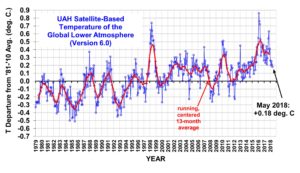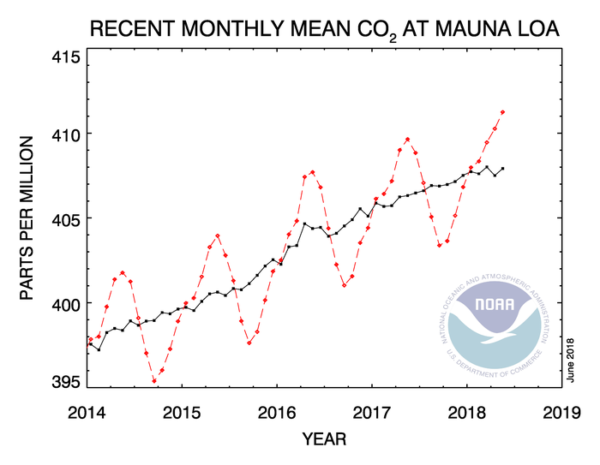De door klimaatalarmisten beloofde verschrikkelijke opwarming wil maar steeds niet komen.

Sinds de El Niño warmtepiek van twee jaar geleden is de gemiddelde wereldtemperatuur met 0,7 graden Celsius gedaald.
Moeder Natuur weigert zich te conformeren aan de uitkomst van de door het VN-klimaatpanel gebruikte klimaatmodellen, die opwarming voorspellen (beter: projecteren).
De lezer zal deze spectaculaire ontwikkeling waarschijnlijk hebben gemist, want de gevestigde media hebben niet daarover gerapporteerd. Hoe anders zou dat zijn geweest als we een stijging van die omvang zouden hebben gehad. Dat zou dan voorpaginanieuws zijn geweest.
In dezelfde periode is de CO2–concentratie in de atmosfeer blijven stijgen.

Je moet er voor hebben doorgeleerd om uit het tegengestelde verloop van temperatuur en CO2-concentratie te concluderen dat CO2 (van welke oorsprong dan ook: natuurlijke of menselijke) een dominante invloed uitoefent op de temperatuur.
Zouden de astrofysici die afkoeling in plaats van opwarming verwachten als gevolg van de inactiviteit van de zon dan toch gelijk krijgen? Dat zou een vernederende afgang opleveren voor vele klimaatbevlogen protagonisten van de menselijke broeikashypothese (AGW = ‘Anthropogenic Global Warming’) en een deconfiture voor alle belangen die daarvan financieel profiteren. In dat geval zou ook de geloofwaardigheid van de wetenschap, politiek, media, milieubeweging en zelfs die van de Paus een flinke knauw krijgen.
Maar we weten het niet. De waarnemingsperiode is te kort om daarover op dit moment conclusies te kunnen trekken.
Hypes komen en gaan. De redenen zijn vaak niet erg duidelijk, zeker niet voor de eigentijdse waarnemers. Het is al weer 15 jaar geleden dat ik een poging heb gedaan om de opkomst van de klimaathype te verklaren. Het resultaat daarvan is hier te vinden.
Thans zijn er signalen dat de klimaathype langzaam wegkwijnt. De VS lopen vaak voorop bij dit soort veranderingen. En Europa hinkt achteraan. In de VS loopt de publieke belangstelling voor klimaatverandering terug, terwijl de regering Trump zich uit de klimaatovereenkomst van Parijs heeft teruggetrokken.
Onder de titel, ‘Climate Change Has Run Its Course’, analyseert Steven Hayward de factoren die bepalend zijn voor de nakende teloorgang van de klimaathype. Ik pik er een aantal elementen uit.
Steven Hayward:
Climate change is over. No, I’m not saying the climate will not change in the future, or that human influence on the climate is negligible. I mean simply that climate change is no longer a pre-eminent policy issue. All that remains is boilerplate rhetoric from the political class, frivolous nuisance lawsuits, and bureaucratic mandates on behalf of special-interest renewable-energy rent seekers.
Judged by deeds rather than words, most national governments are backing away from forced-marched decarbonization. You can date the arc of climate change as a policy priority from 1988, when highly publicized congressional hearings first elevated the issue, to 2018. President Trump’s ostentatious withdrawal from the Paris Agreement merely ratified a trend long becoming evident.
A good indicator of why climate change as an issue is over can be found early in the text of the Paris Agreement. The “nonbinding” pact declares that climate action must include concern for “gender equality, empowerment of women, and intergenerational equity” as well as “the importance for some of the concept of ‘climate justice.’ ” Another is Sarah Myhre’s address at the most recent meeting of the American Geophysical Union, in which she proclaimed that climate change cannot fully be addressed without also grappling with the misogyny and social injustice that have perpetuated the problem for decades.
The descent of climate change into the abyss of social-justice identity politics represents the last gasp of a cause that has lost its vitality. Climate alarm is like a car alarm—a blaring noise people are tuning out.
This outcome was predictable. Political scientist Anthony Downs described the downward trajectory of many political movements in an article for the Public Interest, “Up and Down With Ecology: The ‘Issue-Attention Cycle,’ ” published in 1972, long before the climate-change campaign began. Observing the movements that had arisen to address issues like crime, poverty and even the U.S.-Soviet space race, Mr. Downs discerned a five-stage cycle through which political issues pass regularly.
The first stage involves groups of experts and activists calling attention to a public problem, which leads quickly to the second stage, wherein the alarmed media and political class discover the issue. The second stage typically includes a large amount of euphoric enthusiasm—you might call it the “dopamine” stage—as activists conceive the issue in terms of global peril and salvation. This tendency explains the fanaticism with which divinity-school dropouts Al Gore and Jerry Brown have warned of climate change.
Then comes the third stage: the hinge. As Mr. Downs explains, there soon comes “a gradually spreading realization that the cost of ‘solving’ the problem is very high indeed.” That’s where we’ve been since the United Nations’ traveling climate circus committed itself to the fanatical mission of massive near-term reductions in fossil fuel consumption, codified in unrealistic proposals like the Kyoto Protocol. This third stage, Mr. Downs continues, “becomes almost imperceptibly transformed into the fourth stage: a gradual decline in the intensity of public interest in the problem.”
While opinion surveys find that roughly half of Americans regard climate change as a problem, the issue has never achieved high salience among the public, despite the drumbeat of alarm from the climate campaign. Americans have consistently ranked climate change the 19th or 20th of 20 leading issues on the annual Pew Research Center poll, while Gallup’s yearly survey of environmental issues typically ranks climate change far behind air and water pollution.
“In the final stage,” Mr. Downs concludes, “an issue that has been replaced at the center of public concern moves into a prolonged limbo—a twilight realm of lesser attention or spasmodic recurrences of interest.” Mr. Downs predicted correctly that environmental issues would suffer this decline, because solving such issues involves painful trade-offs that committed climate activists would rather not make. …
Lees verder hier.



1 reacties :
Metingen Mauna Loa op Hawai? En dat terwijl de zoon van de vorige chef metingen zijn vader heeft opgevolgd en nu dus chef is over de CO2 metingen (voor de hele wereld) en deze vulkaan bovendien uiterst actief is en delen van Hawai met lava doet overstromen?
Een reactie posten